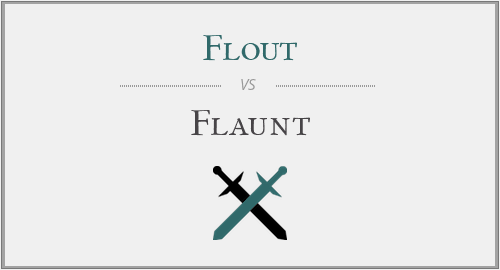He always flaunts about how he flout the rules every time.
The above sentence contains two very closely associated words, flout and flaunt, which have vaguely similar pronunciation and spellings but very different meanings. Does the sentence make sense to you? Can you tell the contextual meanings of both the words just by reading the sentence?
If you can’t, it is alright as many of the writers and learners get confused over this pair of words which is rarely used in everyday speech and writing. In this article, we will enlighten you not only about the meanings of both the words but also their usage and examples and how to tell them apart.
Origin:
Flout originated in mid-16th century perhaps from Dutch fluiten ‘whistle, play the flute, hiss (in derision)’, German dialect pfeifen auf, literally ‘pipe at’, has a similar extended meaning. Flaunt came into being in mid-16th century but its origin is unknown.
Flout as verb:
In English language, flout is always used as a verb where it implies the meaning of openly disregard (a rule, law, or convention). The advertising code is being flouted by the multinational company. With synonyms like defy, refuse to obey, go against, rebel against, scorn, disdain or show contempt for etc. flout also means to treat something with contemptuous disregard. An old and archaic meaning of flout is to scoff or mock someone or something.
The women pointed and flouted at her.
Flaunt as verb:
Flaunt is also used as a verb in English language, (all the more reason both words are confused), where it means to display (something) ostentatiously, especially in order to provoke envy or admiration or to show defiance. It has synonyms like show off, display ostentatiously, draw attention to, make a (great) show of, put on show, put on display, parade or exhibit etc. Newly rich consumers are always eager to flaunt their prosperity. Another meaning of flaunt as a verb is to dress or behave in a sexually provocative way.
She flaunted her moves at the party.

Examples:
The cyclists will sometimes flaunt the law and say their name is “Donald Duck” rather than giving their true identity. [Boston Globe]
The deputy head of the new government … threatened a special operation to depose him should he continue to flaunt the authority of the new regime. [DW World]
I’d much rather proudly display my library card than flaunt an iPad. [NY Times]
Anyone caught repeatedly flouting hygiene rules should be sacked. [Press and Journal]
In the government school where Pooja studies with her younger sister, kids don’t flaunt cell phones or make fun of the kid whose family has a mere Maruti 800. [An Indian Muslim]
Fines would increase for commercial and residential buildings whose tenants flout recycling laws. [NY Post]
Flout or flaunt:
When you flaunt yourself, your wealth, or your accomplishments, you’re parading them in front of people you are showing off but when you show no regard for a rule or moral, you flout. Flout and flaunt are both bad habits and are associated with negatives of the society. Flout has an out at its end which will help you remember its meaning that is related to outlaw. Flaunt has an aunt in it who is something showy.




Have a discussion about this article with the community:
Report Comment
We're doing our best to make sure our content is useful, accurate and safe.
If by any chance you spot an inappropriate comment while navigating through our website please use this form to let us know, and we'll take care of it shortly.
Attachment
You need to be logged in to favorite.
Log In